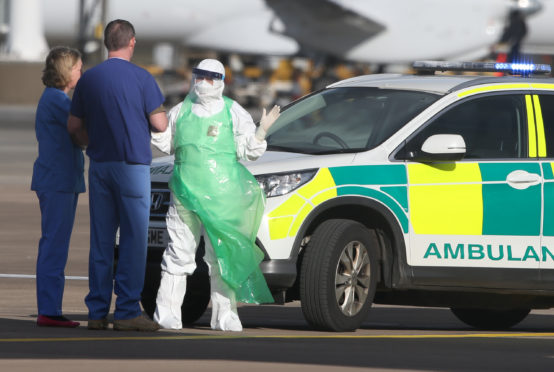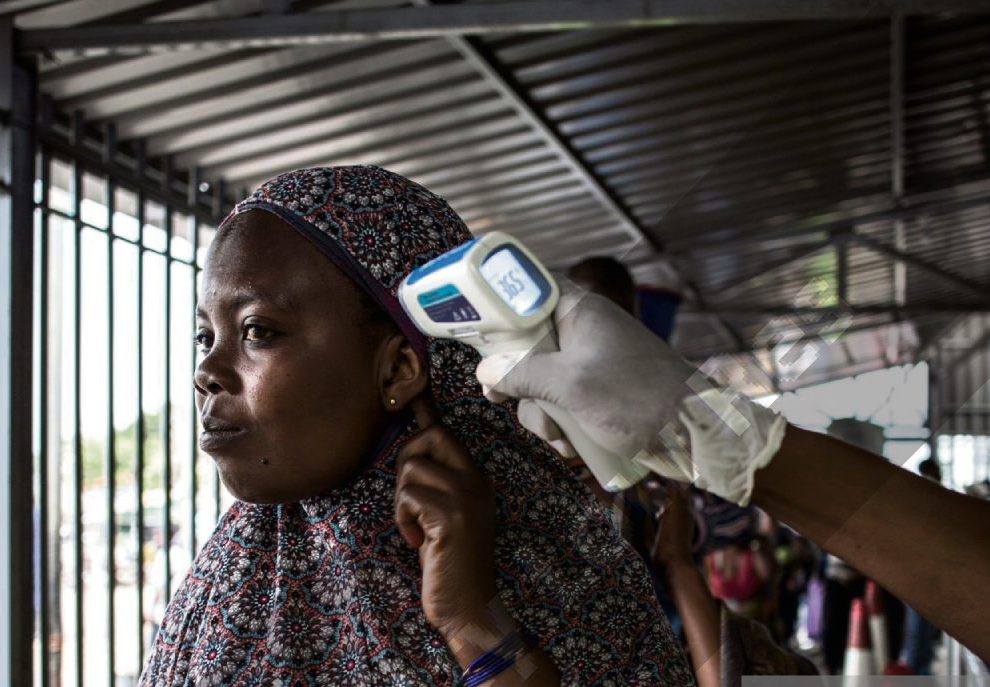
Emma Thomson knows all about the fight to control deadly Ebola. She works on the frontline.
The scientist is leading a Scots team working with experts in Uganda to try to prevent the virus spreading around the world.
And, speaking days after the World Health Organisation declared the Ebola crisis in the Democratic Republic of Congo (DRC) a public health emergency, Emma spoke of her life-saving work at home and abroad.
She has just returned from an assignment which saw her working with domestic scientists to monitor and contain the lethal virus, and detect other diseases before they cost thousands of lives.
When not saving lives overseas, Emma divides her time between her roles as a clinical senior lecturer at the MRC-University of Glasgow Centre for Virus Research and an infectious diseases consultant treating patients at Glasgow’s Queen Elizabeth University and Gartnavel Hospitals.
Her work on the Ugandan border with the DRC saw her team test patients suspected of having diseases caused by Ebola and other viruses.
Viral hemorrhagic fevers such as Ebola are lethal because they leave patients severely dehydrated before their organs eventually fail.
The current crisis in the DRC is the second biggest Ebola outbreak in history and has claimed the lives of more than 1,600 people in the space of a year.
Emma said: “I firmly believe that, if we do not track and stop viruses like Ebola at source, there is a risk that they will travel to the UK.
“Besides that, we have a duty of care to people living in other countries with fewer resources who are under constant threat from dangerous viruses.”
Emma was based at a clinic in the border town of Arua, less than a mile from the DRC.
She said: “I was with doctors and scientists from the Uganda Virus Research Institute in a field lab with fairly basic facilities and then in a very sophisticated laboratory with state-of-the-art equipment in Entebbe, in the south of Uganda.
“They have one of the best viral institutions in Africa and the Ugandan scientists will soon be able to use the methods that we use in the UK to detect viruses.”
Emma’s team worked in an old plague lab. “We repurposed that and screened for viruses using new sequencing methods,” she said.
“Gowns, gloves and facial shields were always worn if we suspected a patient had a hemorrhagic fever.”
Using handheld devices called sequencers, the scientists can spot signs of a virus within a patient’s bloodstream. They are also able to detect antibodies which could fight other infections the victims have been exposed to.
Emma said: “I believe that in five to 10 years we will diagnose routine blood samples will be taken with these sequencers we are using now as a research tool to test for Ebola.”
Given the ease with which people can now travel around the globe, Emma believes the risk of such Ebola and other lethal viruses spreading is ever-present.
“As a junior doctor I was always taught that Ebola and other hemorrhagic viruses would always be contained to remote areas affecting only small numbers of people but that turned out to be wrong,” she said.
“Few believed that people in remote areas of Africa would travel and take it with them.
“Roads and transport have made travel routine.
“It only takes someone to get on a plane to Europe and bring it into larger cities to put huge numbers of people at risk…including the UK.
“Aside froom Ebola, we have had a patient with Crimean-Congo hemorrhagic fever in Glasgow and Lassa fever has also been detected in UK patients.
“Global warming is also likely to increase viral diseases previously found in Africa further north into Europe and could spread other diseases such as malaria to Britain.”
Emma was part of the team who treated Pauline Cafferkey, the Fife nurse who in 2014 contracted Ebola while working in Sierra Leone, where an epidemic killed almost 4,000 people.
The 43-year-old survivor, who was a volunteer in the West African country, where she worked at the Kerry Town Ebola treatment centre, last month gave birth to twin sons.
The current outbreak is believed to have stemmed from a toddler who was bitten after playing with bats in Guinea, West Africa.
Emma’s duties included catching the nocturnal mammals and checking if they are infectious.
“We were gowned up and wore protective gear to ensure that if the bats were infected, we wouldn’t be,” she said.
The survival rate is just 30-40% due to the lack of good medical care.
In countries with excellent health services, including the UK, that rises to 70%.
Emma said that in some cases it took a huge amount of trust and co-operation to persuade people of the importance of vaccines and deterrents. In the DRC, some of her colleagues have been attacked or even murdered by rebel groups who are convinced medical aid is part of a government conspiracy to kill them off.
“Around 100 healthcare workers have been attacked. Some murdered,” added Emma.
“Despite the serious risks, more than 165,000 DRC people have been vaccinated against Ebola.
“The vaccine is 98% effective.”
The vaccination programme is run by the French medical humanitarian charity Médecins Sans Frontières, the World Health Organisation (WHO) and the DRC authorities, with assistance also coming from the UK Government.
Emma, whose work has seen her newly promoted to professor in her Glasgow department, said: “The joy of working with the Uganda Virus Research Institute is that it gives us the chance to discover many unknown viruses yet to be uncovered in Africa that could threaten other parts of the world.”
However, now that Ebola has reached the DRC city of Goma, which has a population of more than a million and is a major transport hub, the WHO fear the worst.
A pastor who was part of a laying-on-of-hands healing mission is believed to have carried the virus there.
“Uganda is hugely at risk because the DRC border is long and roads weave in and out of the area,” added Emma.

Enjoy the convenience of having The Sunday Post delivered as a digital ePaper straight to your smartphone, tablet or computer.
Subscribe for only £5.49 a month and enjoy all the benefits of the printed paper as a digital replica.
Subscribe